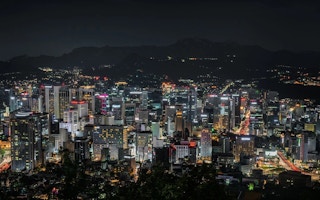South Korea declared a climate crisis on Thursday and established a non-binding goal of reaching net-zero emissions by 2050, making it the second East Asian nation to set a tougher climate target this week.
The ‘climate emergency’ resolution was passed by the country’s national assembly and will see South Korea put together a special committee tasked with ramping up the nation’s response to the threats of global warming.
The task force will guide South Korea’s climate action spending, gather input from stakeholders, review current climate and energy policies against its new ambitions, retool the country’s workforce, and provide support for vulnerable groups.
The nation also aims to raise its emission reduction target for 2030, although the resolution does not give further details. It does, however, urge the government to submit a new climate pledge to the international community.
South Korea is the first East Asian nation to officially define climate change as an “emergency”. Similar declarations have been made by more than a dozen other countries including European Union member states and the United Kingdom.
The document highlights South Korea’s growing contribution to global warming, which brings increasingly disastrous impacts, from droughts, floods and heat waves to forest fires and typhoons.
It also calls for action on biodiversity destruction and stronger nature conservation to protect carbon sinks like forests, which are considered nature-based climate solutions due to their ability to suck carbon from the atmosphere.
While climate activists welcomed the resolution, they warned it may yet turn out to be “hollow” if South Korea, the world’s seventh-biggest carbon emitter, fails to follow through with concrete measures.
Joojin Kim, managing director of Seoul-based advocacy group Solutions for Our Climate, told Eco-Business the new climate target did not legally bind the country to strengthen its Nationally Determined Contribution under the Paris climate Agreement.
But, he said, the resolution signalled that legislators back a stronger climate pledge and would pile additional pressure on the government. With 258 of the 300 national assembly members present on Thursday, 252 voted in favour of the document, and six abstained.
The 2015 Paris accord aims to curb global heating by capping greenhouse gas emissions, but it permits countries that signed the treaty—a list that includes South Korea and most of the nations in the world—to set their own decarbonisation targets.
At the United Nations climate summit in November, known as COP26, countries were expected to submit updated pledges to cut emissions, or Nationally Determined Contributions. But amid the Covid-19 pandemic, the meeting has been postponed to next year.
The new resolution comes two days after China, the world’s biggest polluter, vowed at a virtual United Nations General Assembly that it would strive to be carbon neutral by 2060 and strengthen its national climate pledge under the Paris Agreement.
It also follows on the heels of a proposal submitted by the European Union to ratchet up its climate commitments and slash emissions by at least 55 per cent by 2030. The bloc already announced last year that it would become carbon neutral by mid-century.
Achieving net zero emissions would require South Korea to radically transform its economy, which is dominated by energy-hungry industries such as steel, car manufacturing and shipbuilding as well as electronics. As of 2019, coal made up nearly 40 per cent of the nation’s power mix, with gas accounting for almost 25 per cent, and renewables for less than 4 per cent.
In March this year, President Moon Jae-in’s Liberal Party of Korea unveiled its Green New Deal package, a collection of sweeping green policies aimed at curbing the country’s contribution to climate change, as part of its election manifesto. But up until now, the government has largely failed to adopt the promised green policies.
While the nation plans to invest US$10.8 billion in renewables, hydrogen, electric mobility and social services by 2022, it continues backing new coal power projects both domestically and overseas, and recently bailed out a major coal plant manufacturer, Doosan Heavy Industries, in a bid to lift the economy out of its coronavirus-induced slump.
South Korea—which is also the world’s third-largest public financier of coal ventures—has long been under fire for failing to act on climate change. Its climate commitments are rated as “highly insufficient” and not consistent with keeping global warming below 2 degrees Celsius by Climate Action Tracker, a research organisation which analyses countries’ climate pledges.
There are at present seven coal power plants under construction in South Korea, Kim said. Meanwhile, government-owned utility Korea Electric Power Corporation (Kepco) is trying to secure board approval for moving ahead with the controversial Vung Ang 2 coal power station in Vietnam.
A set of legislative bills proposed in July that would put an end to the nation’s public support for coal ventures beyond its borders has yet to be passed into law. “If these kinds of high-emissions projects are not stopped, could we really say that the country is serious about tackling the climate crisis?” said Kim.
Climate Action Tracker estimates that South Korea’s existing climate mitigation measures will see the country miss its “very weak” 2030 target under the Paris accord, which would only cut emissions by 24 per cent relative to 2017 levels.

















